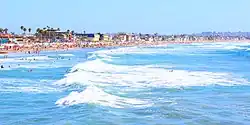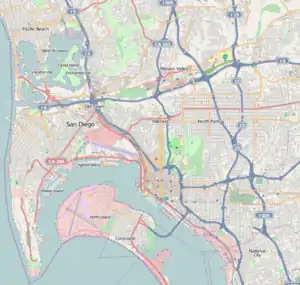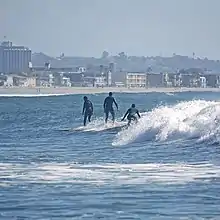Pacific Beach, San Diego
Pacific Beach is a neighborhood in San Diego, bounded by La Jolla to the north, Mission Beach and Mission Bay to the south, Interstate 5 to the east and the Pacific Ocean to the west.[1] While formerly largely populated by young people, surfers, and college students, because of rising property and rental costs the population is gradually becoming older and more affluent.[2] "P.B.," as it is known as by local residents, is home to one of San Diego's more developed nightlife scenes, with a great variety of bars, eateries, and clothing stores located along Garnet Avenue and Mission Boulevard.
Pacific Beach, San Diego | |
|---|---|
| Pacific Beach | |
 The beach at Pacific Beach looking south | |
| Nickname: "P.B." | |
 Pacific Beach, San Diego Location within Central San Diego | |
| Coordinates: 32.7978265°N 117.2403142°W | |
| Country | |
| State | |
| County | |
| City | |
History
Before European contact, the area was settled by the Kumeyaay people, who built a large village then known as Hamo, or Jamo, on the banks of Rose Creek at the entrance of Rose Canyon.
As with many California cities, the history of San Diego's development can be traced back to the completion of a cross-country railroad in 1885.[3] The town developed during the boom years between 1886 and 1888 by D. C. Reed, A. G. Gassen, Charles W. Pauley, R. A. Thomas, and O. S. Hubbell. It was Hubbell who "cleared away the grainfields, pitched a tent, mapped out the lots, hired an auctioneer and started to work".[4] A railway connected Pacific Beach with downtown San Diego starting in 1889, and was extended to La Jolla in 1894.[3]

Early landmarks and attractions in Pacific Beach included an asbestos factory (established in 1888), a race track, and the San Diego College of Letters (1887-1891), none of which survive today.[5][3] At the turn of the century, lemon growing and packing dominated the local economy.[3] In 1910, the San Diego Army and Navy Academy, a preparatory school, was established in an old College building; in 1922 a public high school followed and a junior high in 1930.[3] In 1927, Crystal Pier opened; the Roxy Movie theater opened in 1943 to cater to a population that grew five times during World War II.[3] The postwar period saw the establishment of many hotels: the Bahia (1953), the Catamaran (1959), and Vacation Village (1965).[3] High-rise construction in nearby Mission Bay led to the establishment of a 30-foot height limitation for buildings in 1972, an ordinance still in effect.[3] Prominent boardwalk Ocean Avenue was closed in 1982 and became a park.[3]
In 1902, lots sold for between $350–700 for oceanfront property. By 1950, the population of Pacific Beach reached 30,000 and the average home sold for $12,000.[6] Nonetheless, a small number of farms remained. Today, homes can sell for millions of dollars.
In 1945, over 1,900 residents petitioned to remove the name of William Payne from the middle school because they did not believe that a black teacher deserved to be there. At the time, only two black families owned property in the neighborhood. In 2021, following a wave of name changes in the wake of the murder of George Floyd, the San Diego Unified School Board voted to rename a joint-use field at the middle school after Payne and his wife Fannie.[7]
The United States Navy operated an anti-aircraft training center at Pacific Beach during World War II.[8] During the 1960s, development continued to increase with the city's investment in Mission Bay Park, including the developments of the Islandia, Vacation Village and Hilton Hotels. In 1964, Sea World opened south of Pacific Beach.
The original name of this feature was "Bay Point" and today one may still find a USGS bench mark and associated RM (DC1025, DC1026 respectively) with that name there.[9] The "Bay Point Formation" is the name of a local rock strata first found and described there.[10]
Geography
The beach

The beach stretches for miles from the Mission Bay jetty to the cliffs of La Jolla. The boardwalk, officially called Ocean Front Walk/Ocean Boulevard, is a pedestrian walkway that runs approximately 3.2 miles along the beach from the end of Law St. in the north down into Mission Beach, ending at the mouth of Mission Bay in the south. There are numerous local shops, bars, hotels, and restaurants along the boardwalk, and it is generally crowded with pedestrians, cyclists, rollerbladers, skateboarders and shoppers. Adjacent to the boardwalk is the Crystal Pier, a public pier and hotel at the west end of Garnet Avenue. San Diego City Council banned the use of all electric-motor scooters in December 2019.[11]
Streets

The streets in Pacific Beach were renamed several times before receiving their current designations in 1900.[4][3] The primary north-south street running parallel to the beach is Mission Blvd., with the streets named after late 19th century federal officials, then incrementing in alphabetical order as they move further from the coast: Bayard, Cass, Dawes, Everts, Fanuel, Gresham, Haines, Ingraham, Jewell, Kendall, Lamont, Morrell, Noyes, Olney, Pendleton, Quincy, and Randall. Mission Boulevard was formerly Allison Street, being the "A" street of the series. Ingraham was initially named Broadway (1887), then was changed to Izard (1900), back to Broadway (1907) and finally settled as Ingraham Street in 1913.[3]
The east-west streets are mostly named after precious stones. Starting at the north end of Mission Blvd. and heading south, the streets are:
- Agate
- Turquoise
- Sapphire
- Tourmaline - see Tourmaline Surfing Park
- Opal
- Loring
- Wilbur
- Beryl
- Law
- Chalcedony - pronounced locally "chal-SED-nee" or "CHAL-sə-doh-nee", unlike the stone: "kal-SED-n-ee"
- Missouri
- Diamond
- Emerald
- Felspar - an alternate spelling of "Feldspar" that has fallen out of use
- Garnet - pronounced locally with the second syllable accented, /ɡɑːrˈnɛt/, unlike the pronunciation of the stone
- Hornblend - spelled differently from the mineral hornblende
- Grand
- Thomas
- Reed
- Oliver
- Pacific Beach Drive
Climate

Pacific Beach has a semi-arid subtropical climate (Köppen climate classification: BSk) with warm-summer Mediterranean characteristics. The sun shines more than 300 days each year in Pacific Beach, and rainfall averages less than 11 inches per year.
| Climate data for Pacific Beach, San Diego | |||||||||||||
|---|---|---|---|---|---|---|---|---|---|---|---|---|---|
| Month | Jan | Feb | Mar | Apr | May | Jun | Jul | Aug | Sep | Oct | Nov | Dec | Year |
| Record high °F (°C) | 89 (32) |
91 (33) |
95 (35) |
99 (37) |
101 (38) |
103 (39) |
108 (42) |
104 (40) |
108 (42) |
107 (42) |
97 (36) |
87 (31) |
108 (42) |
| Average high °F (°C) | 65.6 (18.7) |
65.7 (18.7) |
65.8 (18.8) |
68.3 (20.2) |
69.0 (20.6) |
71.0 (21.7) |
74.5 (23.6) |
76.0 (24.4) |
75.5 (24.2) |
72.6 (22.6) |
69.1 (20.6) |
65.2 (18.4) |
69.9 (21.1) |
| Average low °F (°C) | 48.9 (9.4) |
50.6 (10.3) |
53.1 (11.7) |
55.8 (13.2) |
59.5 (15.3) |
61.9 (16.6) |
65.4 (18.6) |
66.7 (19.3) |
64.7 (18.2) |
60.5 (15.8) |
53.6 (12.0) |
48.5 (9.2) |
57.4 (14.1) |
| Record low °F (°C) | 30 (−1) |
32 (0) |
39 (4) |
40 (4) |
47 (8) |
51 (11) |
57 (14) |
57 (14) |
54 (12) |
42 (6) |
36 (2) |
34 (1) |
30 (−1) |
| Average precipitation inches (mm) | 2.24 (57) |
2.08 (53) |
2.12 (54) |
0.73 (19) |
0.21 (5.3) |
0.09 (2.3) |
0.03 (0.76) |
0.10 (2.5) |
0.22 (5.6) |
0.39 (9.9) |
1.04 (26) |
1.27 (32) |
10.51 (267) |
| Source: [12][13] | |||||||||||||
Parks and recreation
In addition to bordering the Pacific Ocean and Mission Bay Park, Pacific Beach includes Kate Sessions Park and the Pacific Beach Recreation Center. Kate Sessions Park has a playground, large lawn with ocean views, and a many acre unmaintained area used for hiking and mountain biking. Fanuel Street Park is a popular bay-front park with playground equipment suitable for toddler and school-age children. Rose Creek, which flows through Pacific Beach before emptying into Mission Bay, provides open space and a rich wetland area.
Surfing
Pacific Beach is open to all surfers.[14] The level of difficulty is intermediate and can be surfed all year.[15] The south wind makes surfing best though in the fall and winter. Many surfers wear dry or wetsuits as water is in the high 50s in the winter and high 60s to low 70s in the summer.[16]
Organizations
The nonprofit Pacific Beach Town Council promotes the area and organizes community events.[17] Save Pacific Beach is residents working together to better the community.[18] The Pacific Beach Planning Group advises the city on land use and other issues.[19] The Pacific Beach and Mission Bay Visitor Center provides information on the Pacific Beach Town Council, special events, lodging, dining, and Pacific Beach history.[6] Service clubs include Kiwanis, Rotary, Lions Club, Girl Scouts, Pacific Beach Woman's Club,[20] Surf Club, Friends of the PB Library, PB Garden Club, and Toastmasters.
Education
Pacific Beach public schools are part of the San Diego Unified School District. They include Mission Bay Senior High School, Pacific Beach Middle School, Pacific Beach Elementary, Kate Sessions Elementary, Barnard Elementary, and Crown Point Junior Music Academy .
Media
Pacific Beach is serviced in print by the daily San Diego Union Tribune and the weekly Beach & Bay Press.
In popular culture
In John Dos Passos's The 42nd Parallel (1930), Fainy "Mac" McCreary briefly lives in a bungalow in Pacific Beach with his wife Maisie and their daughter Rose.
Love All You Have Left was filmed at a private residence in Pacific Beach.[21]
Notable people
- Caroline Amiguet, actress
- Frank Bompensiero, mobster
- Vinny Curran, actor and co-owner of Thrusters Lounge
- Dinesh D’Souza, political commentator
- Mark Dice, a YouTuber
- Donna Frye, former city council representative and mayoral candidate
- Skip Frye, professional surfer
- Vic Fuentes, musician
- Adam Gnade, musician-novelist
- Tony Gwynn Jr., former outfielder in the MLB
- Robert Hays, actor, known for role in Airplane
- Mark Whitney Mehran Owner of Hotrodsurf
- Kate Sessions, Landscape Architect
- Pauly Shore, actor, former MTV host
- Eddie Vedder, musician
Gallery
 The Crystal Pier at sunset
The Crystal Pier at sunset Pacific Beach looking north, Crystal Pier in the distance
Pacific Beach looking north, Crystal Pier in the distance Surfers at Crystal Pier in Pacific Beach, California.
Surfers at Crystal Pier in Pacific Beach, California.
See also
- Tourmaline Surfing Park at the north end of Pacific Beach
- List of beaches in San Diego County
- List of California state parks
References
- "Community Profiles Pacific Beach - City of San Diego Official Website". www.sandiego.gov. Retrieved 15 April 2018.
- "Pacific Beach". www.sandiego.com. 10 July 2011. Retrieved 2018-02-09.
- Fry, John (1987). A Short History of Pacific Beach. Pacific Beach: John Fry Productions.
- "Locker, Z.B., "Whatever happened to Izard Street?" Journal of San Diego History, 1976". sandiegohistory.org. Retrieved 15 April 2018.
- Fetzer, Leland (2005). San Diego County Place Names A to Z. San Diego: Sunbelt Publications. p. 108.
In 1869, the site of the district's first race track, Agricultural Park ... promoters founded Pacific Beach Subdivision in 1887. Here they erected the San Diego College of Letters ... When it failed, its buildings became the Hotel Balboa.
- Pacific Beach and Mission Bay Visitor Center Archived 2013-01-05 at archive.today
- Taketa, Kristen (2021-03-10). "San Diego Unified changes name of Junipero Serra High School, removes conquistador mascot". San Diego Union-Tribune. Retrieved 2021-03-10.
- "U.S. Naval Activities World War II by State". Patrick Clancey. Retrieved 2012-03-19.
- "NGS Datasheet Datasheet Page". Archived from the original on 2014-11-06. Retrieved 2015-03-10.
- Valentine, James William (1 July 1959). "The Bay Point Formation at its type locality (Calif), (Part) 1 of Pleistocene molluscan notes". Journal of Paleontology. 33 (4): 685–688. Retrieved 15 April 2018 – via jpaleontol.geoscienceworld.org.
- "San Diego bans e-scooters along the boardwalk from Mission Beach to La Jolla". 17 December 2019. Retrieved 3 March 2020.
- "Zipcode 92109". www.plantmaps.com. Retrieved April 11, 2021.
- "Climate in Zip 92109". www.bestplaces.net. Retrieved July 26, 2023.
- "Surf in San Diego: Why Surf Pacific Beach?". San Diego Surf Lessons | All Ages Surfing School in San Diego 4 Beaches. 2019-09-05. Retrieved 2021-10-05.
- "Pacific Beach Surfing". RootsRated. 2016-04-22. Retrieved 2021-10-05.
- "Pacific Beach Surf Report, Live Surf Cams & 16-Day Surf Forecast". Surfline. Retrieved 2021-10-05.
- "Pacific Beach Town Council". www.pbtowncouncil.org. Retrieved 15 April 2018.
- "About Us". Save Pacific Beach. Retrieved 9 August 2023.
- "Pacific Beach Planning Group - City of San Diego Official Website". www.sandiego.gov. Retrieved 15 April 2018.
- "Pacific Beach Woman's Club". www.pbwomansclub.org. Retrieved 1 January 2021.
- Elling, Regina (2023-10-03). "Pacific Beach residents star in horror comedy perfect for Halloween". PB Monthly. Retrieved 2023-10-08.
| To the North: La Jolla |
California beaches | To the South Mission Beach |
| To the North: Tourmaline Surfing Park |
California beaches | To the South Mission Beach, San Diego |

